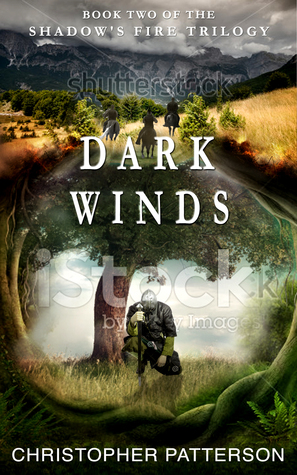Christopher Patterson's Blog, page 4
September 6, 2016
Reviews of A Chance Beginning and Dark Winds by Cheryl Rodriguez
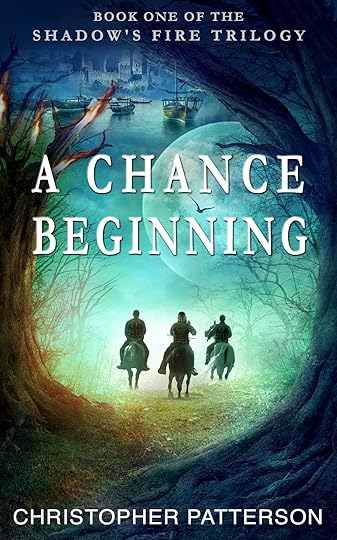
“All young men have grand ideas.” Christopher Patterson’s, A Chance Beginning, is an epic tale of three ambitious and virile, yet naive, young men. Leaving the mundane life of farming behind, two brothers, Befel and Erik, and their cousin, Bryon, embark on a journey seeking the riches in the East. In the beginning, their adventurous quest takes them on a pursuit of purpose. The good-hearted Erik is driven by the idea of a divine purpose, but his egotistical cousin Bryon, motives are of pure selfishness. Traveling down destiny’s path, they encounter things they would never have seen at home and find themselves battling for their livelihood. When a good man’s conscience is seared through battle, will the darkness of soul overshadow the radiant hope held within? These young men find themselves accosted and haunted by what they have seen and done, living a nightmare with eyes wide open. Commissioned by the Messenger of the East, the trio sets out with a crew of mercenaries and dwarves on a now treacherous quest to find a mysterious lost scroll. When good and evil collide, will their expedition be led by the Creator or overtaken by Shadow. Will it prove to be a noble quest or a wayfaring escapade of folly? Only time will tell.
Fantasy is all about good versus evil. In the beginning, A Chance Beginning, plot-line seems predictable, atypical to the fantasy genre. However, as the plot unfolds it begins to take on its own unique, larger-than-life, shape and destination. Mr. Patterson’s writing vocabulary is expansive, often using archaic language and symbolism to bring life to the story. His writing style is acutely descriptive, not only does he give a voice to his characters, but resonating sounds to his scenery as well. Although overwhelming at times, I appreciate the depth and extensive detail given to his main characters. The author understands the importance of character background and development for a successful epic trilogy. Keeping with the fantasy genre, Mr. Patterson tells his enchanted fairy tale with unrestrained imagination by vividly illustrating the mythology and geography of his imaginary world. (The inclusion of the map drawing was a nice touch.) By using ancient and mystical weaponry, the author portrays intense graphic battle scenes that allow you to sense the death-defying adrenaline surge of the characters, amid the spellbinding chaos, and blood and guts of the barbaric fighting. A Chance Beginning ending was a cliffhanger; Christopher Patterson left you on the edge, anticipating the next book in the Shadow Fire Trilogy.
“All young men have grand ideas”
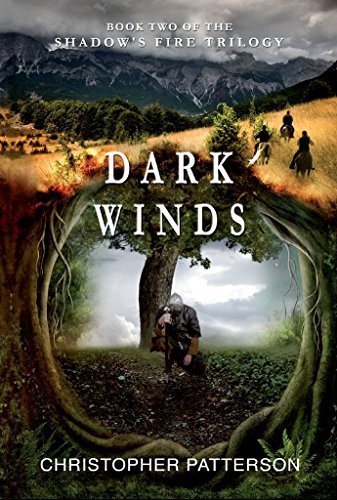
Christopher Patterson captures your imagination, holding you hostage in the fantasy world of Dark Winds. The quest continues for the treasure and prized heirloom lost in the dwarfish city of Orvencrest. The Shadow’s influence is growing stronger, war wages; the era of The Great Peace is coming to an end. For the adventurous trio of Erik, Befel and Bryon, the world has become much larger than it seemed on the farm. The further they travel from home; the longing for its comfort grows stronger. The cost of their adventure has come with an unforeseen high price to pay - Death. So much death, agonizing sorrow haunts their days and phantoms of morbid faces invade their sleep. Overwhelmed with guilt, the young warriors grieve over the men they have killed and their fallen comrades. Erik and his companions are in constant danger; many are on their trail, some seek to right a wrong, and others to kill them before they reach the treasure. Although fate has brought them together, tensions are rising within the company of mercenaries. The opposition and competition is great. However, for Erik, Befel and Bryon there is something more valuable than riches and an ancient heirloom, their manhood is at stake. Daily, they are being tested in faith, strength, will and purpose. As they travel closer to the mountains, there is a foreboding change in the winds; the “Dark Winds” are approaching. “Things are changing. The world is changing.” They are changing.
Dark Winds is the second book in The Shadow’s Fire Trilogy. The narrative poses two vital questions: What makes a savage? What makes a hero? Christopher Patterson is a creative and gifted storyteller. His love of fantasy, adventure, music and faith are relevant in his writing. He takes the elements of fantasy, covers them with flesh and blood, crafting an adventure that comes alive with unrestrained imagery. Vivid, brilliant and figurative language is used to paint graphic word pictures, especially regarding the barbaric battle scenes, and the fear drenched animations suffered during nightmares. The narrative begins with a band of tormented wounded warriors. Their battle fatigue and disgruntled moods are heightened by ominous weather, bizarre blood moons, and evil surroundings. As the plot progresses, the narrative goes deeper into its primitive world, depicting horrific mountain trolls, weapons with consciences, and a subterranean dwarf kingdom. The primary conflict of the story lies between the forces of good and evil, and it is through this divergence the aforementioned questions of savagery and heroism are answered. Man versus himself is the subordinate conflict. With his innocence warped, the protagonist experiences inner turmoil. Traumatized by the exploits of battle; he is wrecked by guilt.
Dark Winds is written in third person omniscient point of view, allowing for the soul and idiosyncrasies of the characters to be exposed. The cast of characters is extensive; it is a blend of young and old, dwarves and men, villains and heroes. However, the narrative focuses mainly on the lives of Erik, Befel and Bryon. Erik is the protagonist; through his character growth, the overall theme of the narrative is unveiled - As you overcome the challenges of life, you change. Patterson pens many memorable lines. My favorite is “Knowledge is the most powerful weapon the world has ever known.” During the rising action, Erik’s destiny compels him to face danger transforming him from a farm boy into a warrior. At the apex of the action, he discovers his life has purpose; this breakthrough releases the desire for increased knowledge. As the story closes, Erik’s maturity sets him apart from the others. Dark Winds concludes with a brave resolve. What lies ahead is yet to be seen.
“Knowledge is the most powerful weapon the world has ever known.”
Cheryl Rodriguez is both and author and lover of books. You can find Cheryl's books on her website at Featured Products and you can peruse her reviews on the review section of her website. Reviews.
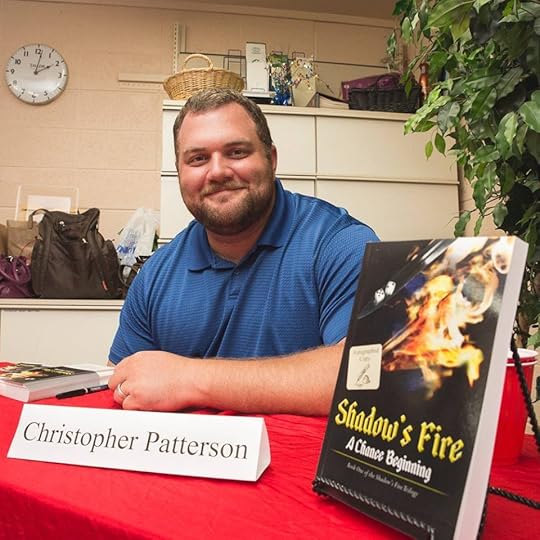
Make sure you visit Christopher Patterson’s website at www.christopher-patterson.com and also make sure you sign up for his monthly newsletter where you can keep up to date with what’s going on in his world, his articles and blogs, get access to freebies, and experience promotional material. You can sign up for Christopher Patterson’s email newsletter at http://eepurl.com/b5AUa1
September 5, 2016
The Attack on Indie (Self-Published) Authors by Christopher Patterson
I was in the middle of doing some research for another article I wrote when I came across several other articles dealing with self-publishing. I have to admit, I was excited to read them since they dealt with self-publishing and, even though self-publishing is becoming easier and more mainstream, its still hard to find usable resources. These articles quickly disappointed me. In fact, they downright upset me. I don’t know. Maybe that was their goal. Exert a gut reaction from someone who disagrees. What was the central idea behind these few articles? Self-publishing is a terrible idea, those who are self-published authors really aren’t authors, and writing should be relegated to the elite few.
We Live in a DIY World
I am a little embarrassed to say that there might have been a time in my life when I agreed with these magazine writers and editors. I have always enjoyed writing and reading, but my first artistic love was the guitar. More specifically, I specialized in classical guitar. I practiced relentlessly (most of the time), worked and worked on fundamentals, toiled over studies and modes, and eventually studied classical guitar performance at the University of Arizona. I was proud to be a musician. I was proud of my skill and hard work. I was proud of my ability to sight read.
And then came the self-taught guitarist.
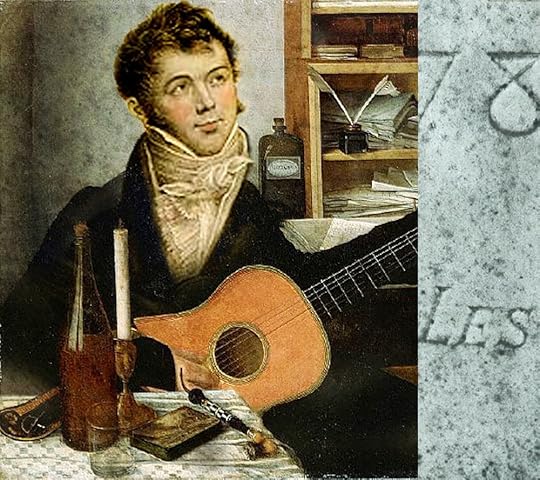
Man, these guys truly pissed me off. They learned a few riffs. Learned a few modes. Learned a couple chords. And there they were, playing on the U of A mall, strumming and singing to whatever the new, hipster song was at the time…and there they were, women swooning over their skill and men wanting to be like them. You’ve got to be kidding me. This guy couldn’t tell you what mode he was playing, or why those chords went together. He certainly wouldn’t have been able to play anything by Fernando Sor or Johann Sebastian Bach. He’s not a real guitarist. Or is he?
I slowly began to understand, as I got older and wiser, that we were both, in fact, guitarists. We were different types of guitarists and our skills definitely lay in different areas. But, nonetheless, we were both musicians. In reality, many of those self-taught, non-music reading hipsters probably have or are making more money at playing the guitar than I even have or will. They recognized a market and played to it. Good for them.
“There Are No Guarantees"This attitude permeates almost every area of our world, every industry, every business. The girl who studied history in school and now makes a living by taking photographs is ridiculed by everyone else who went to school for photography. The self made business man who was a high school dropout receives the scorn of every other business person who has their MBA from some reputable school. The teacher who didn’t go to school to be a teacher, but rather went to school and studied English is now the most decorated Biology teacher in the district, much to the chagrin of every other educational professional. And the examples go on and on and on.
The Industry Has Changed
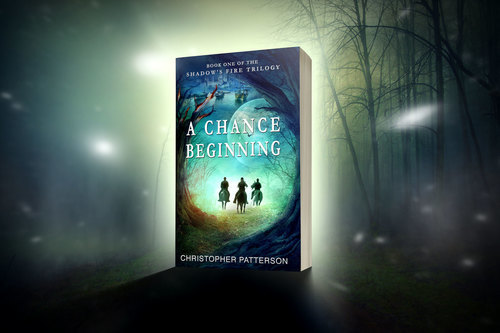
I was in college when I decided I wanted to be an author. I have always loved writing. I loved reading too, but when I read, I was enjoying someone else’s imagination, someone else’s creation. I wanted people to enjoy my creation, my imagination. I had started what would eventually become The Shadow’s Fire Trilogy, as well as several other spin off stories that are still works in progress. I thought what I had was pretty good (it wasn’t at the time) and so I started looking at what I would need to do to get my book published. I was excited, ready to go, and expecting to make a gigantic impact on the fiction world—especially in fantasy. Wow, was I in for a rude awakening.
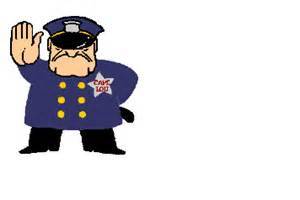
The Gatekeeper
My dad was, for most of my life, a self-employed, small business owner. And he was good. Successful. Innovative. So, when I tried my hand at sales—and I was pretty good at it—I, of course, turned to my dad for advice. I was selling insurance and mutual funds and really trying to target businesses, trying to encourage them to set up company insurance plans and 401(k)’s. My father explained to me the concept of the gatekeeper.
The gatekeeper. The ominous interceptor of information. The ruthless decider of worth and worthless. The unyielding door to the vast riches and markets held by the small (or large) business.

The gatekeeper was usually the front secretary. This was a person who seemingly had a job that was low skilled, low pay, and easily done. Wrong. This is the person most trusted by the boss. This is the person who is privy to management’s most inner thoughts. This is the person who has outlasted all other employees, keeping their head down and doing their job. And one of their jobs? Sift through the countless letters and phone calls and even in person drop ins to determine whether or not they are worth the time of their employer. As a salesperson, you must find a way to either get through, or around, the gatekeeper in order to meet with the big dogs. The gatekeeper was the bane of many salespersons, and the destroyer of hopes and dreams of that one, huge policy that could make an insurance agent rich.
The World of Publishing
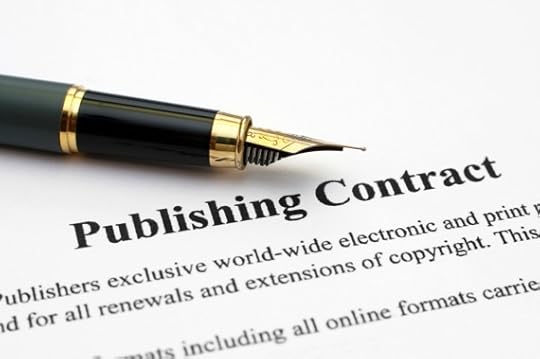
How does this relate to the world of publishing? Simple. The author is the salesperson and the world of publishing has landmines of gatekeepers just looking to blow you up. I was surprised to find out how similar the world of writing and books and publishing was to sales. Only, in the world of publishing, they mask these portentous figures with titles such as agent or acquisitions publisher. And forget about going around them. In the world of sales, if you’re cunning and sneaky enough, you can find a way of avoiding the gatekeeper. Not in the world of publishing. You can’t even step through the door of a publishing house unless you’re being led on a leash by an agent, and not just any agent, an agent with a track record of success.

It is so incredibly difficult to get published today. Like I said, you first must find an agent. So you send out hundreds, if not thousands, of query letters. And after receiving rejection letter after rejection letter telling you your writing just isn’t that good, you steel yourself up, thicken your skin, do several rounds of rewrites and revisions, and repeat the process three or four times. Finally, you get something that is good. People read it and respond positively. You even know someone who knew someone whose cousin’s husband’s cousin worked at a major publishing house, and they assure you, your manuscript is ready. This is it. This is the moment. You send out the query letters. One. More. Time. And…thank you but at this time, we aren’t interested. It’s not your writing though. You no longer suck at the craft you so desperately want to be successful in. No. It’s almost that high school break up letter that no one wants. You would rather your ex-girlfriend tell you that you smell, she thinks your ugly, she hates your family. But instead, she tells you, “It’s not you, it’s me.”
Welcome to the final rejection letter. And why is this one so hard to take. Because, at any other moment in time, like that failed high school relationship, your book would have been a best seller. It was just the wrong time. See, in order to get an agent, in order to get published, you must have experience. You must be fresh and new (remember, there’s no such thing as a new story). You must have published something before. Wait. Record screeching. What? How can I ever get my book published if I need to first be published in order to publish a book that isn’t yet published? Did that last sentence just sound weird? Sure, because that’s what has happened to the publishing industry. How do we get around it? Well…
Welcome to Self-Publishing
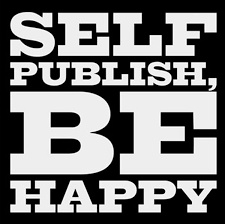
When I first started thinking about getting published, self-publishing—or vanity publishing—was so expensive and treated with so much disrespect by the rest of the writing community, any writer worth anything would have never even considered it. I was lucky enough to actually get picked up by a small publishing company and that only happened because I knew another author who had published with them and she gave me an in. At that point, as you might suspect, I thought I had made it. I was wrong. That was only the first step. I won’t go into the rigmarole that was my experience with a publishing company, but I finally left and found myself at square one again.
By this time, however, self-publishing had started to revolutionize. Amazon had created a company called CreateSpace. They did print on demand. They offered editing services. They even offered marketing services. One of my editors who worked for my former publishing company actually suggested to me that I self-publish. It was much more respected now, much cheaper, and the industry already had several stories of self-published authors selling a ton of books and then getting picked up by major publishing houses. Could that be me? Maybe.
You see, self-publishing offers prospective writers—authors—an opportunity they may not otherwise have. Just like online colleges offer people an opportunity to education, teach yourself music books offer musicians the ability to learn without shelling out a bunch of money, and YouTube offers someone who is otherwise not mechanically inclined a way to work on their car.
The Attack
The Huffington Post posted an online article written by Melissa Foster and Amy Edelman in 2012 that listed four reasons why Indie Authors aren’t respected. It was a well put together list. I agree with all the reasons.

Bad editing
A lack of gatekeepers
Quantity over quality
Crappy covers[1]
Yeah, pretty much spot on. But these are things that a self-published author can overcome. Find editors who want to pump up their resume. Save up some money and pay for it. Find students at your local college going through Creative Writing degrees. Take your time. Understand the concept of delayed gratification. Know that the more time you take, the better your product is going to be. And be willing to shell out a couple hundred dollars for a good cover. I found Adriana Hanganu. She does an amazing job and she is very reasonable.
Melissa Foster also suggested in an article titled “Are Self-Publishing Authors Killing the Publishing Industry?” that Indie Authors are killing the publishing industry by “creating a devaluing for the written word.”[2] Wow. Thanks. In some cases, I am sure there are pretty terrible self-published works out there, but are they any worse than some published works. I mean, read several books about a certain shade of color, or a series about sparkling vampires. These are better simply because they were published by a traditional publishing house? In another Huffington Post article, this one written by Dr. Jim Taylor, an adjunct professor at the University of San Francisco, he asks the question, “Are Self-Published Authors Really Authors, or Even Published?”[3] Dr. Taylor confesses that four of his 14 books are self-published, but still gives a somewhat unfavorable view of the self-publishing world.
The article that upset me the most, and the one that prompted me to write this article, was an article from the New York Post. Joseph Epstein writes an article entitled, “Think You Have a Story in You? Think Again.” Epstein completely trashes writers thinking about self-publishing and eventually finishes his article with this condemnation: “Don't write that book, my advice is, don't even think about it. Keep it inside you, where it belongs.” [4] I’ve linked all these articles to their online sources, so you can read them yourself if you want.
Final Thoughts
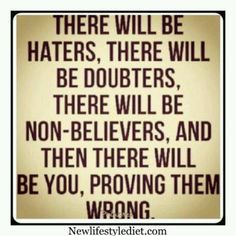
This world is full of nay-sayers. And, using the words of my wrestling coach in high school, there are no guarantees. The only guarantee I can make you is that if you don’t give something a shot, if you don’t do your absolute best, if you don’t work hard, you will not make it and you will not be successful. What is my advice to you? Keep writing. Don’t just write for the sake of writing. Write your best, whatever your goal is. Understand what self-publishing means. Understand the hurdles you have to overcome if you decide to self-publish. But keep that dream alive, and let other people read it. Don’t keep it to yourself. Don’t ever stop believing in yourself. Write your story and Dare to Dream.
Make sure you visit Christopher Patterson’s website at www.christopher-patterson.com and also make sure you sign up for his monthly newsletter where you can keep up to date with what’s going on in his world, his articles and blogs, get access to freebies, and experience promotional material. You can sign up for Christopher Patterson’s email newsletter at http://eepurl.com/b5AUa1
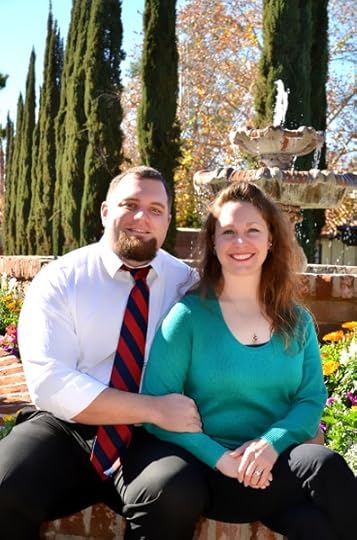
[1] Losowsky, Andrew. "The Big Reasons Indie Authors Aren't Taken Seriously." The Huffington Post. TheHuffingtonPost.com, 30 Jan. 2012. Web. 25 Aug. 2016.
[2] Foster, Melissa. "Are Self-Publishing Authors Killing the Publishing Industry?" The Huffington Post. TheHuffingtonPost.com, 24 Oct. 2012. Web. 25 Aug. 2016.
[3]Taylor, Dr. Jim. "Are Self-published Authors Really Authors or Even Published?" The Huffington Post. TheHuffingtonPost.com, 30 Sept. 2013. Web. 25 Aug. 2016.
[4] Epstein, Joseph. "Think You Have a Book in You? Think Again." The New York Times. The New York Times, 27 Sept. 2002. Web. 25 Aug. 2016.
August 31, 2016
Christopher Patterson’s Review of Duel of Fire (Steel and Fire Book 1) by Jordan Rivet
4 out of 5 Stars

I visited my brother in Baltimore this weekend. In case you don’t know, I am from Tucson, Arizona, so Baltimore was a bit of a cultural and environmental shock. I was surprised that in Maryland, they have washes with water in them all the time. They call them rivers. Crazy. Anyways, while flying out to and back from Baltimore, I was able to read several books. The first of those two books was Duel of Fire by Jordan Rivet. I found Jordan and her books as I was searching for new and upcoming writers like myself. I had reached out to Jordan to see if we could maybe do a review swap. That ended up not happening, but Jordan is from Arizona and, so after reading the synopsis behind her book and the reviews of her previous works, I decided to read her book anyways. I am glad I did.
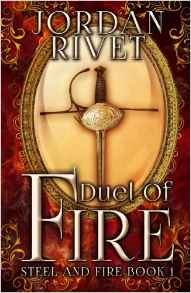
Duel of Fire is not your typical, quest or voyage and return fantasy. It takes place entirely in the kingdom and city of Vertigon, which is situated among three tall mountain peaks and connected by a series of bridges. The story begins with a young duelist (fencing athlete) named Dara. Dara is aspiring to be sponsored by some noble as she climbs the athletic ladder and makes a name for herself (as well as a living) as one of the greatest female duelist, or possibly any duelist, ever. In very typical fashion, her family—who are Fireworkers—do not support her pursuits, but she doesn’t care. She is eventually approached by her coach who wants her to work with the Prince of Vertigon, fearing for the young man’s safety. A series of somewhat predictable events unfold as a plot to kill the King of a rather peaceful Vertigon unfolds and Dara learns some very deep and dark secrets about her own family.
As threats emerge from the shadows, Dara will have to raise her sword
There were a couple refreshing things about this story. Firstly, like I said before, this is not your typical hero goes on a journey fantasy. It centered around an athlete-coach relationship, which I could relate to since I am also a coach. The conflict between Dara and her family was somewhat predictable, but it was well written and left the reader empathizing with Dara. The idea of Fireworking, or Firemagic, was different and interesting, and the dynamic of the nobility as they were written in the story and the focus that was placed on dueling competitions was different as well and reminded me of many cultures in our own history, when time become some what peaceful and rather complacent. There is well written mystery surrounding the rest of the world which is intensified by the fact that Jordan only focuses on Vertigon, even though she mentions other cities and kingdoms.
So, some of the negatives. The storyline was somewhat predictable. The relationship between the protagonist and her family, the relationship between the protagonist and other characters were just very, well, predictable. It wasn’t bad. It didn’t take away from the enjoyment of the book. But there was little mystery surrounding most of the plot. There was some, and that was welcomed. I also felt like this book might have, in some places, been written for a young adult audience, even though I didn’t think it was being billed as such. Now, I understand this is a coming of age type novel, and the author did a very good job of creating the sense that this was indeed a coming of age tale.
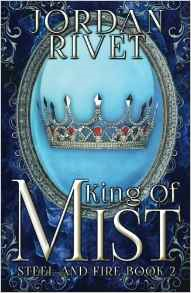
All in all, I gave the first installment of the Steel and Fire Series 4 stars out of 5. It was well written. There were very few editing issues. The plot was well constructed. The ideas were fresh. The characters had depth to them. I look forward to reading the next installment in this series, King of Mist.
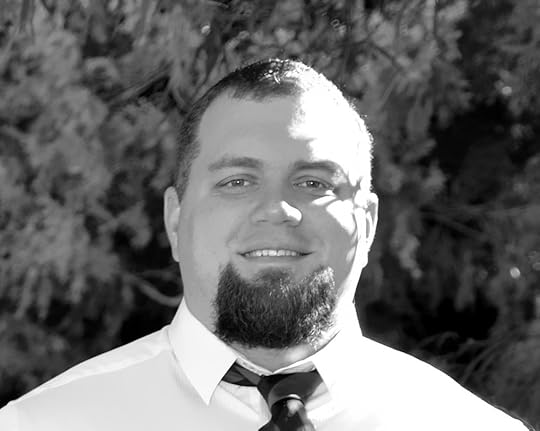
Make sure you visit Christopher Patterson’s website at www.christopher-patterson.com and also make sure you sign up for his monthly newsletter where you can keep up to date with what’s going on in his world, his articles and blogs, get access to freebies, and experience promotional material. You can sign up for Christopher Patterson’s email newsletter at http://eepurl.com/b5AUa1
August 30, 2016
How to Be an Audio Book Narrator by Amrit Sandhu

If you’ve ever heard an audio book and have thought, “I’d love to do that”, then I’ve written this guide for you. This is all I know about being an audio book narrator. I’m a newb in this field however I’d like to tell you it’s much easier than you think, and also much more challenging than you think.
Yes, this sounds controversial, however being an audio book narrator is not hard, if you have kids then you’ve probably been doing it already each time you read a bedtime story. But the hard part can be learning the new skills both on computer and vocal, setting up your studio, and most important of all, sticking with long books.
If you have any questions, then don’t be afraid to post in the comments below and I’ll get back to you. Failing that, you can email me direct at amrit@laughingmonkey.tv or get my contact details through my website on www.laughingmonkey.tv.
As for what mic I use, after doing a lot of research I decided on getting the Cad E100S which is an American made mic. It had great reviews and was a favourite for voice over artists. The Cad came out much cheaper than the Neumann’s so it fit my budget. So far I’ve been pleased with the results.
I’m not going to go through setting up a home studio. There are countless videos on youtube on that, but, if you want to see photos or videos of my setup then just ask in the comments below. If enough people ask, I’ll post some.
Voice Acting
Being an audio book narrator is a lot like being an actor. In fact, you certainly will be acting the roles of the characters you speak. However there is no physical visual performance being recorded, even though you might be animated in your physical appearance, you won’t be performing on stage in front of an audience, nor will anyone see anything you do, so it is 100% dependent on your voice to get the message across to your listeners. You might think that’s obvious, however when you only have your voice to deliver a message, it’s very important you understand what the author is saying and you’re able to deliver the message in that way. Hence reading a subject you understand or are at least familiar with is often a good first step.
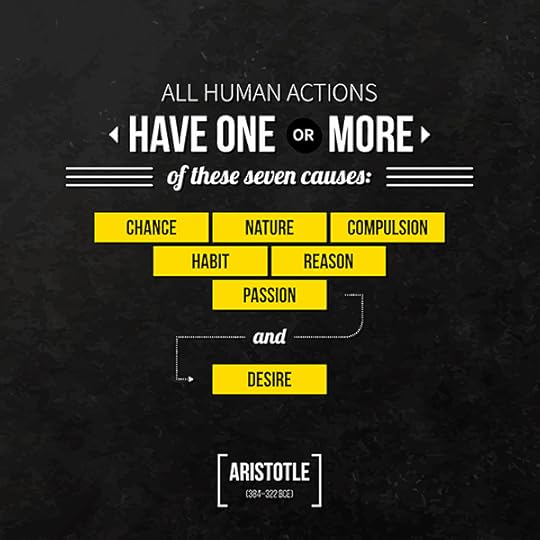
What Motivates You?
The reason you start recording an audio book is an important question. It is your reason is what will get you through to the end. Or not. So ask yourself, why do you want to narrate a book? Whilst the idea may seem romantic at first, that idea will soon fade once you experience the vast amount of work, time and effort it takes to record a finished piece. I’ll go into the time it takes to record and produce a final piece later.
Are you doing it to become famous? Are you doing it so you can make money? Or are you doing it so that you can tick this off as another thing you wanted to do in life? My reason? Well simply put, I wasn’t looking at monetary value, nor any fame aspect. I simply wanted to have a recorded piece which my children could listen to forever, long after I was gone from this mortal body. So it was my gift for them. That reason was strong enough to get me through to the end of the book without giving up. And that’s what you need. Whatever your reason for wanting to record a book, as long as it is stronger than your desire to quit you will be fine and get through it. So do it for you mum to listen to, in the worst case.
Oh, and as far as fame goes, I hate to admit it to you, but unless the person is already famous, I wouldn’t be aware of who is narrating an audible book I’m listening to. And since it’s all audio, I would have no idea if that person passed me on the street, so no, this is one field where fame is not prevalent. However, for me, that was one thing that attracted me even more to it. I didn’t want to be famous. But I did want to create.
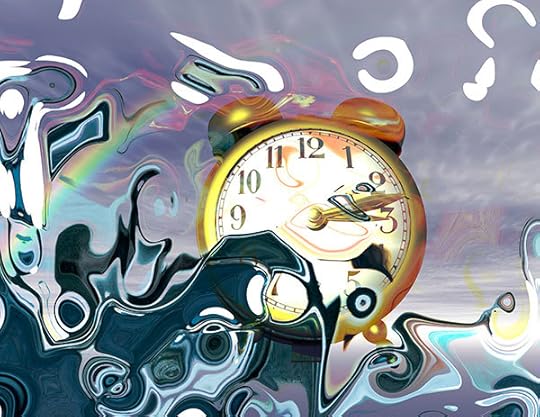
How Long Does it Take?
An hour of recorded finished audio can take between 4 to 8 times that to edit and finalise. That’s a lot of investment for a book which is 36 chapters long. I found it took me about 40 minutes to read 5 pages. Editing time took me around 2-4 hours for that piece depending on how many mistakes there were in my read. Of course, as the book went on I became a better reader and was able to read with less mistakes.
So yes, the time invested in recording an audio book is going to be longer than you plan. So your reasons are what will get you through it.
Start Practise Recording
Right, so I’m assuming you’ve got your mic, your studio is set up and you’re ready to go. My advice is take a book you like - any book, and start recording yourself. Read the first chapter whilst recording yourself.
Next, listen back to it whilst reading your book. There will most likely be a lot of background noise, a lot of pauses, times you’ve forgotten to read words out or times you’ve just missed entire sections altogether. Usually, the first attempt will be awful. So don’t worry about that.
Whilst you’re listening to your audio, think of how you could have said it better. Or imagine a professional actor narrating the book.
Now I would like you to re-record the voice over and think of the actor who is narrating it. Slow your words where necessary. In fact, we often read too fast when we’re nervous, so get used to that red light saying record and be comfortable in it and slow yourself down.
Listen again.
Basically, that’s what I did, over and over, until I was happy with what I heard. This is your school time. You are learning to use the tools, getting comfortable with the mic, learning to read in a quiet room with nobody to listen to you except a computer. You will get it. Just keep with it. If you absolutely hate it, then maybe this is not for you. But if you enjoy telling the story and strive for improving your recorded performance, then this sure is for you.
Edit
So the editing phase is where you get to have fun and improve things. Like taking away the background noise removing long unnecessary pauses, and even changing the tone of your voice.
I use a tool called Adobe Audition for this, but free software such as Audacity is just as good.
Learn how to use your software of choice. There are plenty of help videos on youtube on this.
The Test
So once I was confident in what I produced was good, I asked a few other people to listen to it, and see if they were engaged and enjoyed it?
This can be tricky as people often don’t want to do things that others ask them to do, especially anything that takes longer than 5 minutes. So, it will be a good idea to make a friend, who has a similar interest whom you can critique back. You can also set up a local meetup group, or better still join a facebook group such as the VoiceOver Club.
If you can read one chapter well, then you can read the whole book.

Listen and Repeat
A great way of increasing the kind of accents you have is by practicing them. And a great way to practice is by listening to different accents you hear, and mimicking them. When you’re watching a film, or tv show, attempt to copy the actors voice. The more voices you have in your bag, the more variation you can add to your audio book.
The other great way to practice is when you’re listening to radio adverts. These are actually good ways to practice different delivery methods: is it naturally spoken or not, which words have they emphasised. The key is to listen and repeat.
One way I found was that different voices come from different sources of the body. A booming voice might come from the belly, whereas a squeaky voice will be all from your throat.
Strive for excellenceThis is something I realised in my life a long time ago (in a galaxy far far away). Those who strive for excellence, will always keep growing. They will better than they were. Continuously.
So if there’s one piece of advice I can give which is crucial to this, and probably any task you set before yourself, strive for excellence. It’s not about doing the best you can do, it’s about finding ways you can do better, to give the best final product.
Don't Over Perform
Now I admit, sometimes I record pieces where I think at the time I have produced something superb. And then I play it to somebody else and they think it’s cheesy or over performed. This is a common problem in voice over. We can give it our all and then over perform, and come across terrible.
But that’s ok. Just tone it down. Maybe take a break from the mic for a bit and return and have another go at it. Record several versions of a shorter piece and ask people what they prefer.

Get Your First Audio Book Contract
So by now you should be in a place where you’ve practised, and have received good feedback. So put yourself together a short showreel and go to www.acx.com and choose a title you’ll be happy to read.
Don’t be discouraged by not receiving an offer. It could be that your voice just doesn’t match what the author had in mind for that particular book, so keep applying and you will get a deal.
If you keep getting rejected, then contact me and I should be able to give you some advice.
Planning Your Schedule
With ACX once you are offered a position you will need to agree to a delivery date. Now, is the time to work your schedule. How long will it realistically take you to record it? How much quiet time do you actually have? Are you away on a holiday, or another event? Are people staying over at yours who will be potentially loud? All these factors will drastically affect your ability to finish your book on time.
I try to set one rule in life when it comes to delivering a project: “under promise so you can over deliver“. There will be times where you might not be able to record due to illness, or random guests coming over, or your computer dies (by the way, always save to a cloud device such as google drive), so factor this buffer time. If you think you can get it recorded in a month, easily, including edits, double that time.
The Recording ProcessInitially when I started out recording I began reading one chapter at a time. On average this took me about 45 minutes to do. Then I would send the recording to Chris, he would listen and let me know if I was on track or not. In the most part I was often on track. However, because there were 36 chapters in total, this would become a very long slow process. So I found simply by reading more than one chapter at a time, I was able to double my output. My advice is therefore read as much as you can in each sitting. Don’t just settle for one chapter. Read, two or three at a time.
Be sure to take breaks. You will need to keep your energy up and if you do feel your energy dropping, go eat something light and then do a few stretches or maybe go for a walk before starting up again.
I would keep a glass of water at hand, as it can get pretty hot in a recording studio, especially in the summer and your mouth can dry out. It is better not to drink too much water though, rather, just put a small mouthful and swirl it in your mouth to keep it moist. If you drink too much then all kinds of mouth noises will get picked up in the recording.

Communicate with the Author
The beauty about ACX is they are the contract makers and encourage you and the author to interact with each other in any form you want.
The book I read was A Chance Beginning by Christopher Patterson which is actually part of a trilogy called Shadow's Fire. I have to admit I’ve made a friend through this process. There is nothing like two minds getting together as one, so communicate with the author and keep them very much involved in your project.
So if there were delays, I contacted Chris well in advance. Chris was actually more the director of the piece. You see, direction will be needed, and who better by than the author? So Chris and I came up with this process. He would write me paragraph on each chapter, telling me what the tone is, who the characters are and what he imagines the voices should be like, and that was often enough to get things spot on for Chris in terms of what he envisioned.
We didn’t always get it right, there was a time the accent Chris recommended for the Dwarves did not fit in what I envisioned, so I recorded him two versions of the voices and he preferred the one I suggested. So if you do feel something else works then don’t be afraid to share this with your author.
Error Checking
The thing about ACX is it is a shared project with shared ownership. It’s in the interest of both parties to produce an audio book that sells. So that’s two pairs of eyes and ear that 100% want this project to work. There is a saying in Punjab: Two minds together are like 11 individual minds. I have to say, without the guidance and direction of Chris I wouldn’t have produced the book to the level I did.
After recording each chapter, I had Chris listen to it just to make sure I was on track. Then I would begin the edit. Later, the editing took so much time I decided to outsource this part to get the project done. So in the end we had two checks done, one by Chris to make sure the accents were on the right path and mood and tone of each scene was correct, and secondly my editor who would actually pick up a lot of mistakes which we missed out.
At the time of this writing we are on the final corrections of the last 6 chapters. We will then add some background music between every five or six chapters and then combine all of the recordings into one final file.
Marketing
Regardless of your reason for making an audio book, unless it makes money it will be difficult to keep the process going and recording your next book. Therefore it will help a great deal if the author has some kind of following where you know sales are likely.
In most cases, authors on ACX are there because they do not have a large publishing house backing them. Therefore all marketing will need to be done by the author, and possibly you. In fact, this article is written specifically with that in mind, to generate awareness of the book. So blog about it, share it on social media, spread the word and find ways to get sales.
Have Fun
Recording an audio book is a mammoth task but not one that is out of anybody's reach. Therefore, I will say make sure you have fun. Always laugh, during the good times and the bad times, and it will get through it.
Good luck and if you do have any questions on this topic, then give me a shout at amrit@laughingmonkey.tv.

© Copyright LaughingMonkey.tv 2016
August 29, 2016
Writing Your Story by Christopher Patterson
In my last article, Anyone Can be a Writer, I encouraged you to write your story. Now, here’s a big slap in the face: There is no such thing as a new story. What? Seriously? Why am I even bothering, then? Yep. But before you leave, hear me out. That doesn’t mean you can’t write your story.

When I was in college, I took a course that was called “Creative Non-Fiction.” People hear that title and think it somewhat oxymoronic. Non-fiction is about facts, truth, history. There is nothing creative about that. Wrong, and this class—and my professor, Fenton Johnson—proved that.
Two Story Types
I could probably write a series of articles about that class, but one of the things Fenton told us was, “There is no new story.” Most of us in that class had a desire to be a professional writer of some sort and, so, needless to say, that statement was a little disheartening. So he clarified. He started off by telling us there are only two story types out there.
1. Man (used in a general sense here) goes on a journey or quest
2. Stranger comes to town
“There is no new story.”
When you think about it, that’s pretty spot on. Think about the last book you read. It’s either about some sort of journey—physical, emotional, spiritual, or otherwise—or the protagonists dealing with a stranger showing up in their lives and creating change—good or bad.
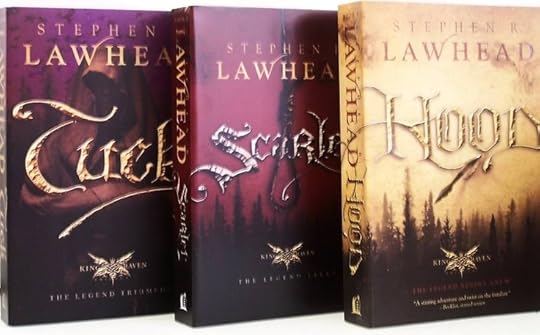
My favorite genres happens to be fantasy and historical fiction, so most of what I read is the journey story. In reality, I cannot think of a fantasy novel that I have read that wasn’t a journey. I did read a historical fiction series call King Raven by Stephen Lawhead that was a “stranger comes to town” type story. It was a different take on Robin Hood, so the stranger(s), you could say, were the Normans.
Two Story Types Equals Seven Story Types
Now I’m just trying to confuse you, right? Nope. I recently came across several articles that talked about the expansion of these story archetypes. Why am I talking about this? Because I think it’s very important for an author to think about what types of story they want to write. One of the biggest mistakes amateur writers make is they don’t plan anything out. They just write. I mean, that’s how the creative juices flow. If I do too much planning, I stifle my creativity.
Well, not really. As I have practiced my writing, I have come to realize that if I plan out a story, outline, have a blueprint in front of me, it actually allows me to be more creative and, yet, stay focused and on task. I now have a goal in sight. What are these story types?
Legends of the slaughter of a destructive monster are to be found all over the world. The thought underlying them all is that the monster slain is preternatural and hostile to mankind
— E.S. Hartland, The Legend of Perseus (1896)
1. Overcoming the Monster: Somewhere out there, a great evil has risen to power and I must destroy it.
2. Rags to Riches: The peasant becomes a king.
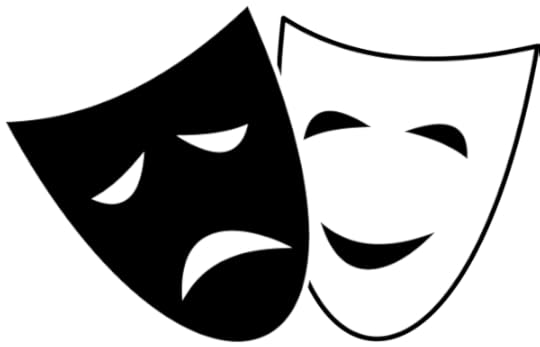
3. The Quest: I must find the princess, the treasure, the grave, etc.
4. Voyage and Return: The Prodigal Son, Back to the Future, etc.
5. Comedy: Self-explanatory, but in the Greek tradition, the type of humor can be different depending on the story and the genre.
6. Tragedy: Could be a rags to riches tale, but everyone ends up losing.
7. Rebirth: Similar to a Tragedy, but in the end, the hero understands their error and makes a change before it’s too late. Think, It’s a Wonderful Life
I’m hoping one of the things you can see here is that many stories are really a combination of two or three, or maybe all these story “types.” So, when I say there is no new story, I’m not saying don’t bother, because what you want to do has already been done. That may be true. But what I am trying to say is, “How do you create a different take on one of these stories?” People have already experienced a quest, a rebirth, a voyage, etc. What sets yours apart from someone else’s? And, how much do you want to be set apart?
Being Unique
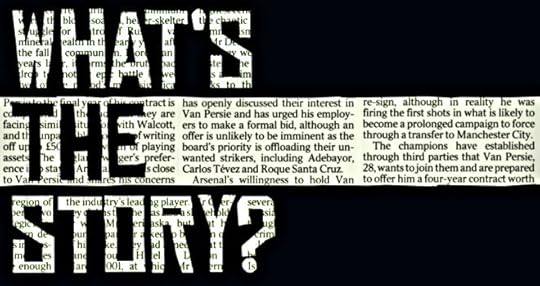
What do you mean, how unique do I want to be? Why wouldn’t I want to be as unique as possible? This refers back to a previous article I wrote. Defining you and writing your story. Your story may involve someone else’s created world. Your story may be a part of someone else’s story. Your story doesn’t have to be completely unique, especially if your goal in writing isn’t to get your work to the masses. People who know you will probably appreciate your story. Those that don’t know you may not, but that’s okay because you don’t care about them. You might be writing to a subgroup within a genre, i.e. lovers of Star Wars or Forgotten Realms, so you’re story exists in an already-created world with already-existing characters. Again, you know who is going to like your work and you don’t really care about the rest.
If you’re looking to make money, get your book into the hands of as many people as possible, and cross genres—which is what my goals are—then you need find your uniqueness. This is where, in my opinion, the real work in writing a story or a book happens. That isn’t to say that someone who writes a memoir or a story in an already existing world or even a creative non-fiction piece is doing great work and isn’t a talented author. However, in order to get people to pick up a book and say, “Wow, I’ve never read a story like this before,” takes a lot of time, effort, imagination, brainstorming, etc.
How an Author Spends their Time
Firstly, if you truly want to be a writer, you must understand that the majority of your work will not be in front of a computer. The majority of your work is done observing, thinking, noting, talking. Then you have to take all these stimuli, all these ideas, understand what other people have already done, and somehow make it coalesce into something new and fresh without losing your own integrity and staying true to your story. Once you have done that, and you write it all down and create your “book,” then you have to edit, decide what you need to throw out (which can be a heartbreaking experience), edit again, have other people read it and endure their criticism.
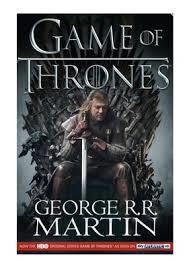
Secondly, you must read other books in and outside of your genre. You need to know what is out there, what is being read, what stories are being praised and what stories are being criticized. You don’t want to beat a dead horse. I dare say, if you were to write a book about five kingdoms in a land that looks oddly like the island nation of Japan and consisted of warring chieftains vying for the power and affection of the king, who has just recently come to power and unified all five kingdoms, all the while staving off the advances of southern zombies (or even vampires or werewolves for that matter) and prevent the former king’s son—an infant when the king died and now a grown man—who can talk to, oh, I don’t know, dragons, from coming into power, you might be accused of stealing your plot ideas from A Song of Ice and Fire—more commonly known as Game of Thrones. You might admit that you heard someone talking about a similar plot, although you have never read the Game of Thrones books nor watched the movie, but, nonetheless, people would not look at the similarities too kindly. Again, as writers, much of our time must be consumed by reading. Not only must we read to gain inspiration and understand what people are reading, but also so we don’t copy what other people are doing. I know that I, as a reader, can’t stand books that clearly rip off other series and authors and books. Again, we as authors will often times rehash the same stories—the adventure to win a princess, to slay a dragon, to protect the infant prince—but can we do it in a unique way.
Authors Who Have Achieved UniquenessSo I turn to authors like George R.R. Martin and J.R.R. Tolkien and J.K. Rowling. I turn to authors like Anne Rice and Dean Koontz and Stephen King. Tom Clancy and Robert Ludlum. These are genre writers who have such a unique spin on their genre, that people who normally wouldn’t read anything from their respective genres read their work. They’ve taken the story types, no doubt, and used them in different ways, so much so that people who can’t stand vampire stories will read Rice and people who can’t stand dragons will read Martin and people who hate horror will read Koontz.
You must make your story unique. How? We could literally write a book on how to be a unique write. Actually, that’s not a bad idea. That would be pretty unique. How did I write my stories and how do I make them as unique as possible?
My StoryI was reading and listening to the first book in Robert Jordan’s Wheel of Time series, The Eye of the World, and at the end of the audio version of his book, there is an interview with Jordan. What Jordan said in that interview literally changed my perspective on fantasy, fiction, and writing in general. He talked about how he created his Wheel of Time series and, one of the biggest mistakes that fantasy authors make, and one he did not want to make, is the simple fact that the journeys and the stories and the plots that we write about are so unbelievable. He wasn’t talking about magic or elves or dragons. He was talking about the fact that you have a man sitting in a bar. A wizard shows up. The wizard tells the man he is going to save the world, and within five minutes they’re off to save the world. In reality, that man would probably buy the wizard a beer, sneak out the back, and tell his friends the next morning he ran into the craziest dude any of them had ever met. That made a lot of sense to me.
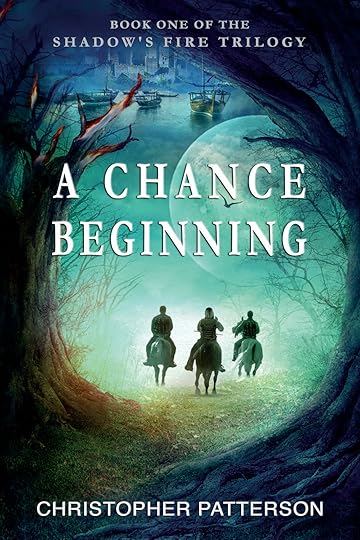
The plot of my trilogy, A Chance Beginning, Dark Winds, and Breaking the Flame, was inspired by a desire to write about the unsuspecting hero and the underbelly of society, to do somewhat what Robert Jordan was talking about—to write about a journey that may have never happened. So often, fantasy is about the shining hero. Well, I asked the question, can’t a hero come out of unsuspecting situations and the shunned parts of society? I wanted readers to believe my world and know that I had meticulously researched my world. I also wanted to write something that exhibited humanity. Not all people are good. Not all people are evil. If we include other races—dwarves, elves, goblins, etc.—why should they be any different? So, is it possible that you have a righteous goblin and an evil elf? I think so. Also, many people pick up a fantasy novel and somehow everyone speaks the same language. Well, in Arizona, all you have to do is drive fifty miles south and the majority of people don’t speak English, so why should my world be any different.
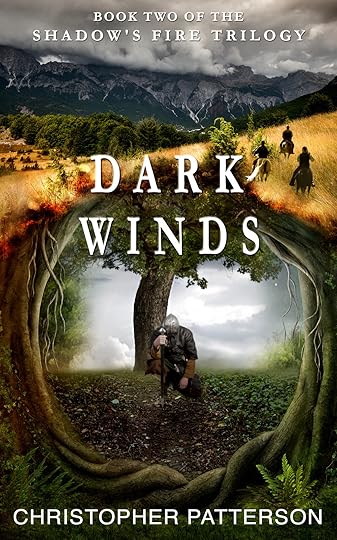
These are all things that I think make my novel a little unique and different enough from the next fantasy novel that people would want to read what I have to say.
Hope you enjoyed this weeks article and writing tips. Until next time, HAPPY READING!!!
Make sure you visit Christopher Patterson’s website at www.christopher-patterson.com and also make sure you sign up for his monthly newsletter where you can keep up to date with what’s going on in his world, his articles and blogs, get access to freebies, and experience promotional material. You can sign up for Christopher Patterson’s email newsletter at http://eepurl.com/b5AUa1
August 24, 2016
Christopher Patterson's Review of The Summerlark Elf by Brandon Draga
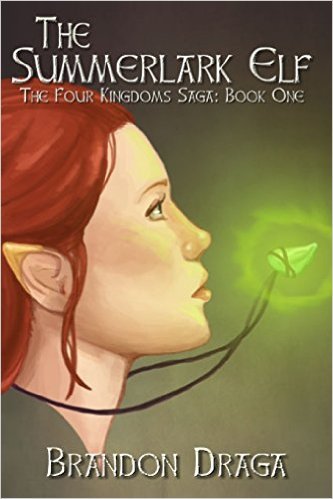
So, not too long ago, as I was wandering in the doldrums of having written two books and selling very few of them, Grael Norton from Wheatmark Press suggested to me a very novel idea—pun intended. I should start reading other author’s works and posting reviews for them. Kind of a “you get what you give” idea. Well, I thought it was a great idea and started upping my reading intake. In doing so, I also began reaching out to other authors, especially those who were self-published and newly published like me, offering review swaps and good, encouraging criticism.
Brandon Draga was one of the first authors to respond positively. He was such a welcoming guy, asked if he could sign me up for his newsletter—to which I said, “of course”—and willingly agreed to buy my book and give it a read when I said I would love to read his works.
So I read The Summerlark Elf and gave it a review. Now, it was a 3 star review, which I posted on Amazon and Goodreads but it was not a critical review, as most 3 star reviews are. I will get to my review, but I just wanted to say about Brandon, he responded to my review on Goodreads. So, normally when an author responds to a review you’ve left, it’s not good. They start to defend what they wrote and why they wrote it and a part of you feels like maybe you were too harsh and you attacked them and their work. I know, as an author, I feel that sometimes, even though I repress the urge to respond. But that is not what happened with Brandon. He responded with kindness and sincere thanks for my review. I think it was a well-meaning gesture and thought it very cool that this author is taking time to not only read his reviews, but respond in kindness to them.
With no further ado, my review of The Summerlark Elf
The Summerlark Elf did have some editing issues and page formatting issues. I don’t hold too much of a grudge in regards to those things, especially if they’re not huge and if I am reading a self-published author. It’s not that we should give self-published authors a pass on good grammar and punctuation, but I understand the cost of getting professional editing. The very best authors have major issues before their editors look through their manuscripts. We self-published authors have limited budgets and, so, minor issues don’t bug me too much.
It is clear to me that this book was written by a fan of Dungeons and Dragons, Lord of the Rings, Game of Thrones and every other fantasy book and game out there. And there's nothing wrong with that. Names are borrowed, as were concepts. No problem. The writing wasn't necessarily spectacular, but it was good. It was easy to read and there were moments of very good writing. I mean, I read the book in three days. It was truly a very quick, easy, and enjoyable read. It was fun. It was a decent adventure. And that is where my criticism lies. My major issue was that I felt like I was reading a Dungeons and Dragons adventure. I felt like I was reading a borrowed story. Now, as an author, I do realize that it is very difficult to come up with a new story. In fact, from a plot-story structure standpoint, I’m not really sure if there are new stories to be told. I mean, we can come up with new names and places and worlds, but—especially when its fantasy—it’s all about either a journey or a stranger coming to town; man vs man, man vs nature, man vs self. So it is within that construct that, as authors, we are tasked with creating something fresh. When reading The Summerlark Elf, I felt like I was reading a story that might qualify for Forgotten Realms or Dragonlance or some other Wizards of the Coast world. Would I read it again? Probably not. Am I going to read the next book? Absolutely. Would I recommend this to someone else? Sure. If you’re into pure fantasy adventure, here is a fun, quick read that is enjoyable. If you're looking for deep plots, intense subplots, genre crossing, and earth shaking statements, probably not here.
Do I recommend the Summerlark Elf. Definitely.
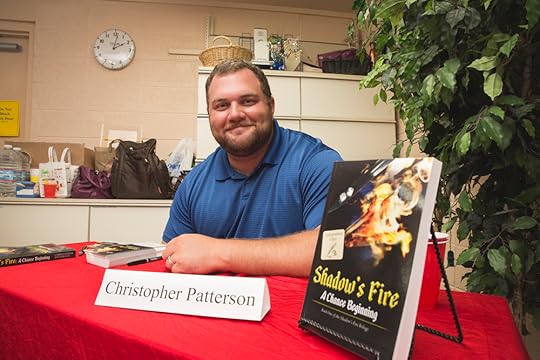
Make sure you visit Christopher Patterson’s website at www.christopher-patterson.com and also make sure you sign up for his monthly newsletter where you can keep up to date with what’s going on in his world, his articles and blogs, get access to freebies, and experience promotional material. You can sign up for Christopher Patterson’s email newsletter at http://eepurl.com/b5AUa1
August 22, 2016
Anyone can be a Writer by Christopher Patterson

Mystery surrounds writing—all of the arts, really. It seems to be weird dichotomy when people learn or find out that you’re a writer, especially the author of a book, let alone a series of books. They are almost in awe, super excited for you, and can’t believe that someone could actually do such a thing. But then, they are critical. How do you make any money? Do you live on rice and beans? What’s your real job? I tend to focus on the awe and excitement.
People are always enthusiastic and happy for me when they find out I am an author. Everyone always says the same things: “How amazing.” “How do you do that?” “I could never write a book.” “I’m not creative.” “I wish I had your creativity.”
Aspiring Authors
Notice you can't even see the published authors on the chart
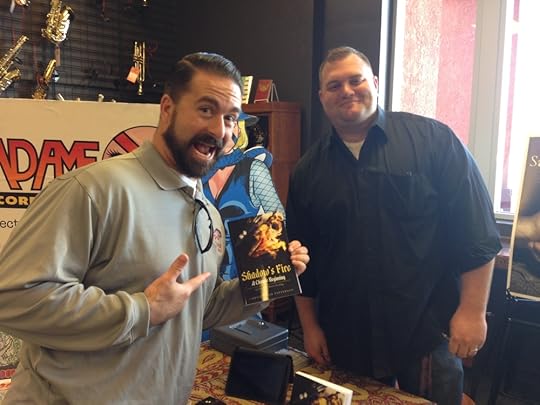
My buddy Tim visiting me at a book signing
Sacrifice and Hard Work

My first book signing at Mostly Books in Tucson
I am very appreciative of the compliments. Trust me, I am more appreciative than many people might think. I try to stay as humble as possible. Humility produces wisdom, after all, even though I am very proud of being an author and the accomplishment that it represents. I do recognize the hard work and the time and the sacrifice that goes into writing book. I live it. But what amazes me the most is how quickly people are to discount themselves, put themselves down, and defeat themselves before they have even tried something. I see it in sports all the time.

As a wrestling and football coach, I experience kids giving up before they even give themselves a chance. It’s too hard. It’s too time consuming. They just don’t have natural ability. Whatever the excuse, they give up before ever getting started. I didn’t realize that same trend in today’s society applied to the arts as well until I officially became a published author. And all the while, the thing I continue to say to myself is, “Anyone can do this.”
I truly believe that. Like I said, I’m extremely grateful for the congratulations and admiration. But really, anyone could do this. I don’t say this to take away from my own creativity or hard work, but one of our mottos on our wrestling team—and one of my mottos in my own life—has always been, “Hard Work will always beat talent that doesn’t Work Hard.”
Define You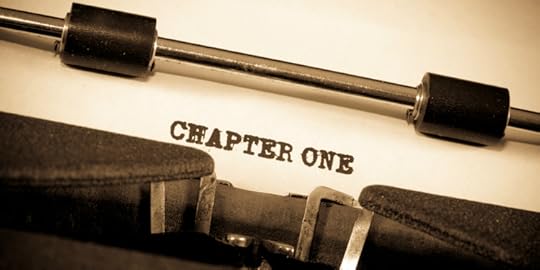
Clearly, not everyone wants to be a writer. So, this is not to say that everyone should be a writer, or that everyone wants to be a writer. This is to say, if you want to be a writer, you can be.
First, let’s define what kind of writer you want to be. That will, of course, dictate what course you take with your writing. I once attended a writing conference put on by Writer’s Digest and the presenter gave us three different types of writers and asked us to decide which one we are.
1. The first type of writer is the writer that simply wants to leave a legacy. This is the person who wants to leave memoirs to their family, create a family tree, or simply get their thoughts onto paper and see it as a book. This writer doesn’t care about sales. This writer doesn’t even care about how many people see their book. It’s all about the accomplishment of writing a book.
2. The second type of writer is the writer who wants to spread a message. This is the writer that has something to say, something important to convey to the world, or a certain group of people. They have experienced something that others have experienced, they have information on important social topics, or they simply want to touch people in a positive manner. This writer does care about how many people see and read their book, but they don’t care about sales. They didn’t write the book for sales. They wrote the book to send a message, tell a tale, etc. They don’t care about how much they make, just how many people read their book.

3. The third type of writer—and the type of writer I am—is the writer who wants to make a living from their writing. They want people to read, and pay, for their work and craft. Now, there is nothing shameful for wanting to make money from your craft. Most authors still have a great story to tell, and they want people to read it. They just want to make money from it as well.
Committing to Commitment
Desire is the key to motivation, but it’s determination and commitment to an unrelenting pursuit of your goal - a commitment to excellence - that will enable you to attain the success you seek
— Mario Andretti
So which kind of writer do you want to be? That’s the first step in this writing process. Next, you have to commit. What do I mean by commit? Commit some time—not a ton. Commit some effort. Possibly commit some money—again, not a whole lot. Commit to actually writing your story, whatever that might be. I think—no, I know—so many things don’t get done in our society simply because people won’t commit to something. Fear. Laziness. Other obstacles. Past failures. Whatever it is, you have to commit to writing your story.
What's Your Story
So, what’s your story? It’s interesting how sometimes the worst advice we get comes from our educators. Now, I say that with great trepidation, since I am, myself, a teacher. And, I have received some phenomenal advice from some fantastic teachers and professors. But, when I was in college and studying creative writing, I had several professors suggest that we write about what is commercially desired. If you want to make money, you need to look at what the market desires and then write that.
What terrible advice. From an economic standpoint, of course you would want to provide what the market wants, but you can do that and still write what you want to write about. People will be able to tell if you’re not writing what you’re passionate about. They can tell when you are, for lack of better terms, BS-ing them. Write what you are passionate about.
My Story
I love fantasy. I grew up reading fantasy and sci-fi, watching fantasy and sci-fi, playing fantasy and sci-fi games. I also love history. I knew that if I ever wrote anything, it would be fantasy, historical fiction, or a combination of the two. I have written contemporary fiction short stories—mostly for my creative writing classes in college. They’re good. I’ve gotten pretty decent feedback on them. But it’s not what I love. I have a hard time pouring heart into those stories. To be successful at anything, you have to be passionate about it, right? If you are a teacher, a doctor, a nurse, a plumber, a police officer, anything, you absolutely must be passionate. That’s not to say you’re going to love what you do every day, but if you hate your job or your career, what’s the point? I feel the same way about writing. What’s the point of writing if you can’t write what you love? You love sparkling virgin vampires who hang out with metropolitan, sophisticated werewolves? Then write about them and don’t worry what other people think, just make sure you write the best damn sparkly virgin vampire/metro werewolf story you possibly can.
Employee Satisfaction (%)
59% of employees said interest in their work makes them happy
Critics vs Good Criticism
You have to ignore critics. I truly believe that no matter what any of us do in life, someone is going to tell us we can’t do it. I mean, would we even have an Olympics if anyone listened to the nay-sayers and do-nothings of this world? Just look at the graph above. Look at how many people aren't satisfied with their job. Do what you love; and do what you think you’ve been called to do, whatever that calling might be. That being said—and I will leave this as the wrap up to my first installment of writing tips—do listen to and pay attention to criticism.
Our Stories, Our Babies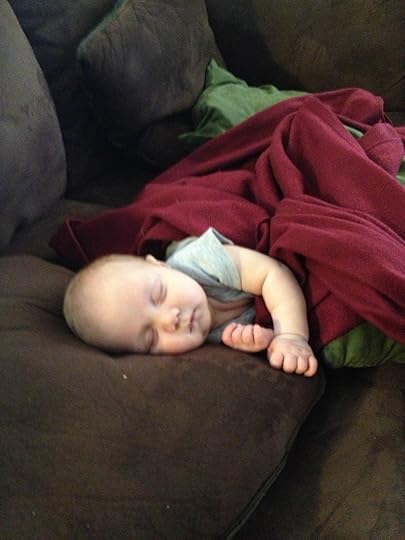
My little man Shaymus
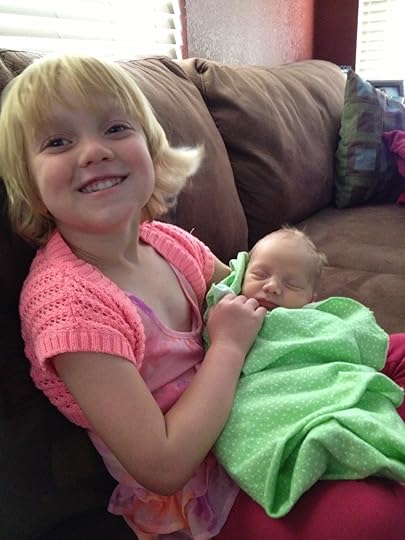
My oldest, Savannah, with Shaymus when we first got to bring him home
Our stories are our babies. I have children. Some of you have children. We take pride in our children. And when people are critical of them, we get defensive. They are, after all, a part of us.
We have this story, this idea, this adventure, this movie playing in our head and it hurts sometimes when someone doesn’t like it or understand it. But there is probably a very good reason for that. Let me say that most fiction is genre specific, as you may well know, so if you write romance and someone who typically reads mystery tells you they didn’t get your romance novel, they didn’t like it, or whatever else, you might take that with a grain of salt—unless you are trying to cross over into a mystery-romance genre. But if someone who reads a ton of romance tells you they didn’t get your story, you might want to listen up. You don’t have to change your story, but it may be a plot issue or a character issue or a formatting issue. Just like a good parent who would listen to other parents who have great kids, as authors we would want to listen to other authors and purveyors of our genre.
I recently received my first two star review, and I have received several three star reviews. I am not necessarily going to change my story because of them, but they do serve as signals or alerts that there are some people out there that might have issues with my style, my story, my method of writing. One of the worst things we can do as authors is be so stubborn about our story that we are unwilling to listen—in essence, we are deaf—to good criticism, criticism that wants to help us get better.
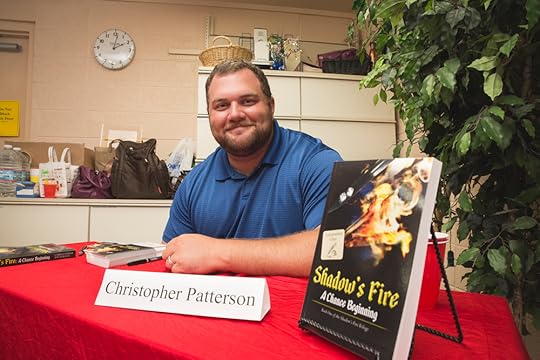
Again, you don’t want to change your story. That is one of the reasons why I left the publishing company I was with before I self-published. They wanted to change my story. Don’t get me wrong. They gave me some great criticism that changed me as a writer for the better, but I had to be open to that criticism. Remember, you know your story. It’s yours. You live it in your head, replaying it like a movie. Your audience doesn’t know it, but you want them to get to know it, live it just like you. So listen to your audience. Let them help you convey your message and your story as best and most effectively as possible.
Until next time, start writing your story and HAPPY READING!!!
Make sure you visit Christopher Patterson’s website at www.christopher-patterson.com and also make sure you sign up for his monthly newsletter where you can keep up to date with what’s going on in his world, his articles and blogs, get access to freebies, and experience promotional material. You can sign up for Christopher Patterson’s email newsletter at http://eepurl.com/b5AUa1
Adams, S. (2014, 06 20). Most Americans Are Unhappy At Work. Forbes.com. Retrieved from http://www.forbes.com/sites/susanadams/2014/06/20/most-americans-are-unhappy-at-work/#623c350f5862
Dietrich, W. (2013, 05 04). The Writer's Odds of Success. TheHuffingtonPost.com. Retrieved from http://www.huffingtonpost.com/william-dietrich/the-writers-odds-of-succe_b_2806611.html
Goldberg, J. T. (2011, 05 26). 200 Million Americans Want to Publish Books, But Can They? Publishing Perspectives. Retrieved from http://publishingperspectives.com/2011/05/200-million-americans-want-to-publish-books/#.V7m114-cHIU
August 9, 2016
What Makes Me Want to Keep Reading by Brett Lindskog

As my tastes in literature have changed I've noticed that I go less and less for cool looking covers and cheesy fantasy novels to more and more realistic fantasy novels. Not realistic as in the fantasy being gone, but realistic as in feeling like the characters could be real people. What really makes me disgusted reading a novel, any novel, is the author playing God with the characters. Machina Ex Deus is lazy writing and a sign that the author is not serious about the humanness of the characters. And if we aren't reading novels to explore humanness at some level, what is the point? The characters are what drives Game of Thrones for example. These feel like real people put into real situations acting in a real way.
Another thing that turns me off of books is not getting to the point. The Wheel of Time is a great example of this. It started off great, neat world, real characters, high fantasy stuff. Then it kept going and going and going, with nothing being accomplished and whatever the characters did accomplish would seem to be set back with convenient resurrections and new prophecies. This was never going to end. I want my time back.
The above things that pull me into and push me away from a book are hard to quantify just by the dust jacket. I usually only go for books recommended to me by the serious readers that I know in my life. I usually can't stand the copy that is put onto the dust jacket. This is why there are things like GoodReads, and Reddit, and the good ole' fashioned book club.
Brett Lindskog is a good friend of Christopher Patterson and an avid fantasy and science fiction reader as well as a reader of Christian motivational non-fiction.
July 18, 2016
Newsletter and Other Updates
http://eepurl.com/b5AUa1
May 12, 2016
Goodreads Giveaway
A Chance Beginning
Christopher Patterson

